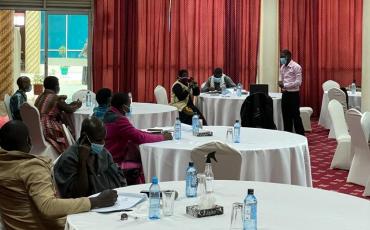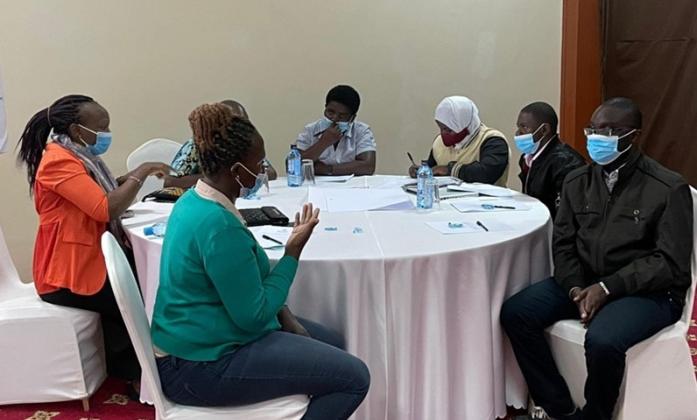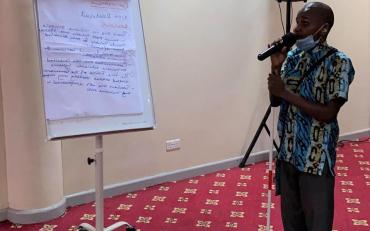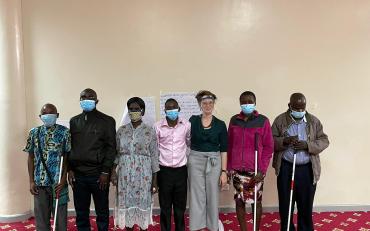On 29th and 30th July 2021, the World Federation of the Deafblind (WFDB), the United Disabled Persons of Kenya (UDPK), the African Disability Forum (ADF) and the International Disability Alliance (IDA) held a two-days technical workshop, in Nairobi, with persons with deafblindness from Kenya, including indigenous youth with deafblindness.
The workshop was facilitated by Agnes Abukito, WFDB-IDA Gender Fellow, Kato Mark, WFDB-IDA Youth Fellow, both with deafblindness from Uganda, Alradi Abdalla, Bridge CRPD-SDGs ToT Officer, and Eleonora Guzzi, IDA’s Programme Coordination Officer.
First day, 29th of June
The workshop made participants acquainted with the key findings and main recommendations of the Initial Global Report on the situation and rights of Persons with Deafblidness, published by the WFDB in 2018. 
Building on the key findings of the report, participants shared their lived experiences to identify and propose good practices to resolve the main issues highlighted in the initial global report.
Following the official opening by ADF, the the Kenya Association of the Deafblind and IDA, participants engaged in a group work to identify the main issues and challenges faced by persons with deafblindness in Kenya.
Both groups identified that:
“Stigma and discrimination, segregating education and lack of affordable assistive technology and information are the main barriers to their meaningful participation in society, which are all connected to the invisibility of persons with deafblindness”.

A second session was dedicated to familiarizing with the Initial Global report, particularly the objectives of the WFDB in producing this report, the methodology, key findings, and usages as a tool to advocate for the inclusion of persons with deafblindness in all sectors
While discussing the key findings, particular attention was given to inclusive education, where all learners learn together, as a vector to bring persons with deafblindness out of poverty.
Participants unanimously agreed that:
“Inclusive education is key to provide persons with deafblindness with equal opportunities in life, including in accessing the job market”.
Second day, 30th of June
The second day was built on the three main issues highlighted in the WFDB Global Report
1. Lack of recognition of deafblindness as a distinct disability;
2. Lack of adequately trained support services, including interpreter-guides;
3. Lack of research and data on persons with deafblindness.
Participants engaged again in group work to discuss at greater length the challenges and good practices around the selected topics for the second global report.
This session was conducive to the following session on the Consultations with Kenyans with Deafblindness on the Global Disability Summit, in which participants identified the priorities of persons with deafblindness that they wish to be discussed during the upcoming GDS 2022, namely:
- Recognition of deafblindness as a distinct disability;
- Free and inclusive education for all;
- Free medical coverage and affordable and adequate assistive devices;
- Inclusive social protection;
- Training of public officials, including medical personnel and teachers on the situation and the rights of persons with deafblindness and on inclusive methodologies;
- Vocational training for acquiring competences and skills to compete equally in the labour market.
A final priority, which came out strongly from all the participants, was the need the build the capacities of persons with deafblindness to advocate for their rights.
The workshop was successfully concluded with appreciations from the participants on the facilitation of the workshop and on the knowledge acquired

Rydone Shitambasi, for instance, an indigenous youth with deafblindness, stated that “he learnt things about the CRPD that he did not know before and that he would transmit this knowledge to his peers once back home”. Christabel Kageha, also indigenous youth with deafblindness, particularly enjoyed “the group exercises, finding the discussions meaningful and helpful to advance her advocacy”.
For further information contact eguzzi [at] ida-secretariat.org.
Read about WFDB Technical workshop in PDF and in Word.
To read more about youth participants Rydone and Christabel click here for PDF and Word.
To see the infographic banner click here for PDF and Word.
<< Back to home page

